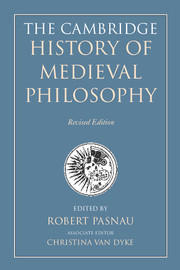Book contents
- Frontmatter
- Contents of Volume 1
- Preface
- List of contributors
- Frontmatter
- Contents of Volume 2
- Introduction
- I Fundamentals
- 1 Origins in baghdad
- 2 The emergence of medieval latin philosophy
- 3 Byzantium
- 4 The rise of the universities
- 5 Monks and friars
- 6 Platonism
- 7 Augustinianism
- 8 Censorship*
- 9 Modernity
- II Logic and language
- III Natural philosophy
- IV Soul and knowledge
- V Will and desire
- VI Ethics
- VII Political philosophy
- VIII Metaphysics
- IX Theology
- Appendices
- Bibliography of primary sources
- Bibliography of secondary sources
- Index nominum
- Index rerum
- References
9 - Modernity
from I - Fundamentals
Published online by Cambridge University Press: 05 August 2014
- Frontmatter
- Contents of Volume 1
- Preface
- List of contributors
- Frontmatter
- Contents of Volume 2
- Introduction
- I Fundamentals
- 1 Origins in baghdad
- 2 The emergence of medieval latin philosophy
- 3 Byzantium
- 4 The rise of the universities
- 5 Monks and friars
- 6 Platonism
- 7 Augustinianism
- 8 Censorship*
- 9 Modernity
- II Logic and language
- III Natural philosophy
- IV Soul and knowledge
- V Will and desire
- VI Ethics
- VII Political philosophy
- VIII Metaphysics
- IX Theology
- Appendices
- Bibliography of primary sources
- Bibliography of secondary sources
- Index nominum
- Index rerum
- References
Summary
There is very little content to the concept of modernity except as a term of contrast with antiquity and the Middle Ages, and what is signified as “modern” changes, depending upon the specific contrast one wishes to make. Historians often use the term to designate nineteenth-century phenomena such as the industrial revolution, the rise of capitalism, the institution of representative democracy, and urbanization. In philosophy, “modernity” is usually taken to refer to the period that discarded medieval or scholastic philosophy, beginning roughly in the sixteenth century and encompassing such intellectual movements as the Renaissance, the Reformation, and the Counter-Reformation, continuing in the seventeenth with what is called the Age of Reason (early modern philosophy), and culminating in the eighteenth with the Enlightenment.
THE COGITO AND MODERNITY
Of course, all of the terms above are imprecise and disputed, but few will disagree that the work of René Descartes typifies early modern philosophy and sets the agenda for the philosophers who came after him. So the question of philosophical modernity – namely, how best to describe the reasons for the rise of modern philosophy and the waning of scholasticism – may be resolved by determining the break one wishes to depict between the work of Descartes and that of the scholastics.
- Type
- Chapter
- Information
- The Cambridge History of Medieval Philosophy , pp. 114 - 126Publisher: Cambridge University PressPrint publication year: 2014

